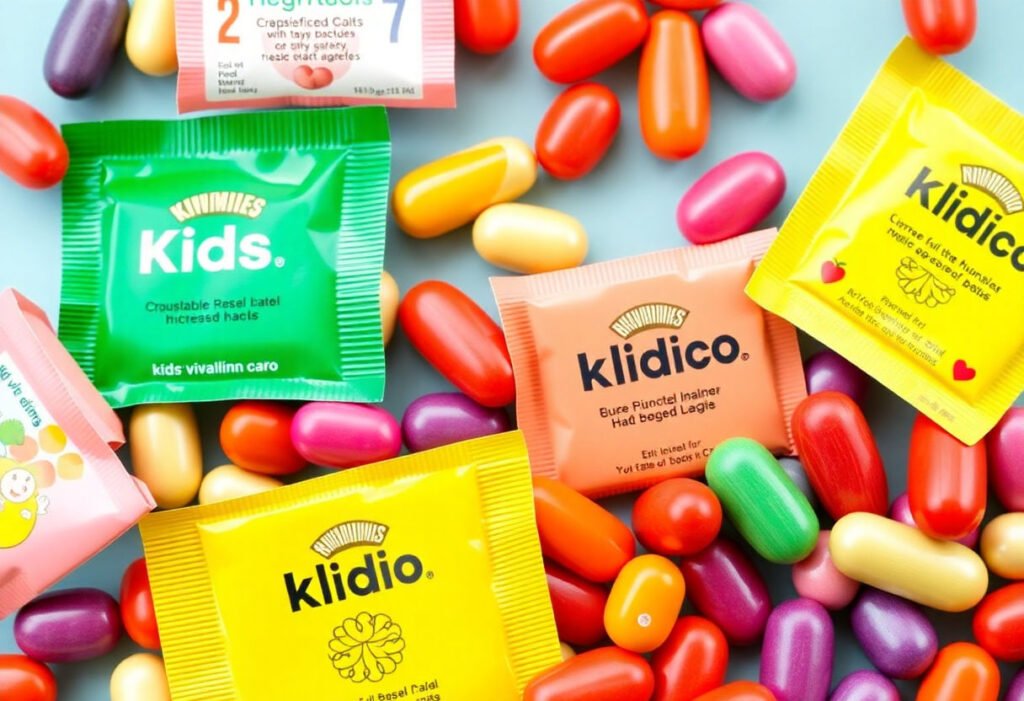Understanding your child’s nutritional needs is crucial in fostering their growth and development. As the market evolves, methylated kid vitamins have emerged as a beneficial option, tailored to enhance vitamin absorption and utilization. This article delves into the unique advantages of these vitamins, explaining the science of methylation and its impact on children’s physical and cognitive development. By comparing methylated with non-methylated vitamins and providing guidance on selecting the right supplement, we aim to arm parents with the knowledge needed to make informed decisions for their child’s health.
Key Takeaways
- Methylated vitamins offer enhanced absorption and metabolism benefits, making them particularly effective for children’s growth and development.
- These vitamins can support both physical health and cognitive function in children, facilitating overall well-being.
- Parents are encouraged to choose methylated vitamins for their ability to aid in crucial developmental processes that traditional vitamins may not fully support.
- Careful selection based on individual health needs and professional guidance ensures maximum benefits and minimal risks when incorporating methylated vitamins into a child’s diet.
What Are Methylated Vitamins?

Methylated vitamins are a specialized form of vitamins that have undergone a biochemical process called methylation. This process involves the addition of a methyl group, a small molecule composed of one carbon and three hydrogen atoms, to the vitamin structure. The primary advantage of this modification is its ability to enhance bioavailability, meaning the body can more easily absorb and utilize these vitamins compared to their non-methylated counterparts.
The preference for methylated vitamins over traditional forms lies in their effectiveness, particularly for individuals who have genetic variations affecting their methylation pathways. Such variations can impede the conversion of regular vitamins into their active forms within the body. As a result, individuals may experience reduced benefits from regular vitamins.
Methylated vitamins are often seen in forms such as methylcobalamin (a form of vitamin B12) and the L-methylfolate form of folic acid. These methyl groups are integral in supporting various bodily functions, including:
- Energy production, through more efficient cellular metabolism.
- Detoxification processes, crucial for maintaining overall health.
- Neurological health, by supporting neurotransmitter synthesis.
For children, utilizing methylated vitamins can play a significant role in their development. Young bodies require readily accessible nutrients to support rapid growth and cognitive development. By choosing methylated vitamins, parents can ensure that their children receive the full potential benefits of essential nutrients, thereby fostering a foundation for a healthy mind and body.
The Science Behind Methylation
Methylation is a fundamental biochemical process that plays a crucial role in the absorption and metabolism of vitamins. This process involves the addition of a methyl group, a simple chemical structure composed of one carbon atom and three hydrogen atoms, to a vitamin molecule. This seemingly small alteration can profoundly impact how the body recognizes and utilizes these nutrients.
The methylation process is pivotal for converting inactive forms of vitamins into their active counterparts. In the case of B-vitamins, for example, methylation transforms folic acid into methylfolate, which is the form that the human body can effectively use. Without this conversion, essential functions such as DNA synthesis, repair, and regulation might be impaired, leading to broader health implications.
Moreover, methylation affects the body’s biochemical pathways, including those associated with detoxification and immune function. An optimal methylation process ensures that homocysteine levels in the bloodstream are regulated, thereby reducing the risk of cardiovascular concerns. This is particularly important for children, who are in a rapid phase of growth and development.
To further understand the importance of methylation, consider its influence on neurological health. Proper methylation supports neurotransmitter production, which is essential for cognitive development and emotional regulation in children. This underscores the significance of incorporating methylated vitamins into children’s diets, as they ensure an adequate supply of metabolically active nutrient forms that are indispensable for their overall development and well-being.
In conclusion, methylation is not merely a chemical reaction; it is a cornerstone of efficient nutrient assimilation and overall health maintenance, particularly for developing children.
How Methylated Vitamins Support Child Health
Methylated vitamins play a crucial role in enhancing child health by addressing specific nutritional requirements with greater efficacy. These vitamins, which include forms such as methylcobalamin (B12) and methyltetrahydrofolate (folate), are already in their active forms, allowing for enhanced absorption in the body. This is particularly beneficial in children with genetic variations that impair their ability to convert non-methylated vitamins into their active forms.
Physical Development: Methylated vitamins significantly contribute to the physical growth of children. By facilitating the production of red blood cells, methylated B12 and folate ensure adequate oxygen transport throughout the body, supporting energy levels and endurance. This is vital for the rapid growth phases that characterize childhood, where optimal vitamin absorption is imperative.
Cognitive Development: The impact of methylated vitamins extends to cognitive functions as well. Methylated forms of folate and B12 are essential for neurotransmitter synthesis, which plays a crucial role in brain function and development. Proper methylation influences factors such as attention, concentration, and memory. Experts suggest that these methylated nutrients may lead to improved cognitive performance, enhancing learning capabilities during critical developmental stages.
Furthermore, methylated vitamins assist in detoxification processes by aiding the removal of toxins and supporting the liver in breaking down and eliminating harmful substances. This detoxification process is crucial for maintaining a healthy immune system, safeguarding children against common illnesses.
In summary, the inclusion of methylated vitamins within a child’s diet supports both their physical and mental health, offering a comprehensive approach to promoting overall well-being and optimal growth trajectories.
Comparing Methylated and Non-Methylated Vitamins

When considering vitamins for children, the debate between methylated and non-methylated vitamins is significant. Methylated vitamins are those that have undergone a process called methylation, making them more bioavailable. This means they can be absorbed and utilized by the body more efficiently, providing a more immediate benefit to children who may have difficulty metabolizing standard vitamins.
In contrast, non-methylated vitamins are the traditional form of vitamins. While effective for many, they rely on the body’s ability to convert them into a usable form. This can be a hurdle for children with certain genetic variations that hinder this conversion process.
Pros and Cons of Methylated Vitamins
-
Pros:
- Enhanced absorption and utilization.
- Beneficial for children with genetic conditions affecting methylation, such as MTHFR mutations.
- May support better cognitive and developmental outcomes.
-
Cons:
- Typically more expensive than non-methylated counterparts.
- Limited research on the long-term effects in children.
Pros and Cons of Non-Methylated Vitamins
-
Pros:
- Widely available and generally less expensive.
- Adequate for children without methylation issues.
-
Cons:
- Less effective for children with specific genetic needs.
- May require higher doses to achieve the desired health benefits.
The choice between methylated and non-methylated vitamins should be guided by individual health needs. For some children, particularly those with unique methylation requirements, opting for methylated vitamins could be more beneficial, fostering improved health outcomes and development. Parents should weigh these factors and consult with healthcare professionals to ensure their child’s nutritional needs are met optimally.
Choosing the Right Methylated Vitamins for Your Child

When selecting methylated vitamins for your child, it’s crucial to consider several factors to ensure they receive the most appropriate nutrients for their unique needs. Age plays a significant role in determining the vitamin dosage and type. Younger children generally require lower dosages and might need vitamins formulated specifically for their age group.
Another important consideration is your child’s dietary habits. If your child is a picky eater or follows a specific diet, such as vegan or gluten-free, look for methylated vitamins that can fill the nutritional gaps. It’s essential to choose vitamins free from common allergens like dairy, soy, and artificial additives to accommodate potential sensitivities.
Evaluate your child’s specific health needs. If they have known conditions like Attention Deficit Hyperactivity Disorder (ADHD), autism, or nutrient absorption issues, methylated vitamins might be beneficial due to their enhanced bioavailability. Consulting with a healthcare provider can help tailor vitamin choices to suit these particular conditions.
When researching vitamin brands, opt for those with a strong reputation for quality and transparency. Look for third-party testing and certifications to ensure the products meet high standards of safety and efficacy. Ingredients should preferably be derived from natural sources to reduce the risk of side effects.
Additionally, it’s wise to consider the form of the vitamins. Some children may prefer gummies or chewable tablets over pills. This preference can significantly affect adherence to a vitamin regimen, making it more likely that your child will take their vitamins consistently.
In summary, choosing the right methylated vitamins involves considering age, dietary restrictions, specific health concerns, brand reliability, and the preferred form of the vitamin. All these factors contribute to a regimen that supports your child’s health effectively.
Potential Risks and Side Effects
While methylated vitamins offer numerous benefits for children’s health, it is essential to remain aware of potential risks and side effects to ensure safe usage. Parents need to monitor their child’s response to these supplements to avoid any adverse effects.
Sensitivity and Allergic Reactions
Although rare, some children may experience sensitivities or allergic reactions to methylated vitamins. Symptoms may include rashes, itching, or gastrointestinal discomfort. It is advisable to discontinue use and consult a healthcare professional if such reactions occur.
Methylation Overload
Excessive intake of methylated vitamins can potentially lead to a condition known as methylation overload. This occurs when there is an imbalance in the body’s methylation cycle, possibly resulting in neurological symptoms like anxiety, hyperactivity, or mood swings. Hence, it’s crucial to adhere to recommended dosages.
Interactions with Medications
Methylated vitamins may interact with certain medications, such as those prescribed for anxiety or depression, leading to increased side effects or reduced efficacy of the medication. Parents should discuss their child’s supplement regimen with a healthcare provider to prevent potential interactions.
Individual Variability
Each child’s metabolism and nutritional needs are unique. Therefore, what works well for one child may not be suitable for another. Continuous monitoring and adjustments may be necessary to determine the optimal dosage and formulation.
Parents should adopt a cautious approach when introducing methylated vitamins, paying close attention to any changes in their child’s health or behavior. Involving a healthcare professional in these decisions ensures a safe and beneficial supplementation process.
Integrating Methylated Vitamins into Your Child’s Diet

Integrating methylated vitamins into your child’s diet can be a seamless process, with thoughtful planning and consideration for your child’s needs and preferences. When introducing these vitamins, it is crucial to ensure that they are compatible with your child’s existing dietary routine and health requirements. Here are some tips to integrate them effectively:
-
Incorporate with Meals: To enhance absorption, consistently provide methylated vitamins alongside meals. Fat-soluble vitamins, for instance, are better absorbed when consumed with food containing healthy fats.
-
Start Small: Begin with a lower dose to observe how your child’s body responds. Gradually increase to the recommended dosage as they become accustomed to the new supplement.
-
Child-Friendly Forms: Select vitamins in forms that are appealing to children, such as chewables or gummies, especially for those who may have difficulty swallowing pills. This can make the regimen easier to follow and more enjoyable for your child.
-
Personalized Meal Plans: Develop a meal plan that naturally complements your child’s vitamin intake. This might include foods high in necessary nutrients like leafy greens or dairy, which support the efficacy of methylated vitamins.
-
Regular Monitoring: Keep track of any changes in your child’s health and behavior following the introduction of these vitamins. Positive changes might include improved energy levels or focus.
-
Educate Your Child: Encourage children to understand the importance of their vitamins as part of a healthy lifestyle, fostering a sense of ownership and responsibility for their well-being.
By integrating methylated vitamins thoughtfully, you can support your child’s health effectively while maintaining an enriching and balanced diet.
Consulting Healthcare Professionals

Consulting a healthcare professional is a crucial step in securing the best possible care for your child’s health, especially when considering methylated kids’ vitamins. Prior to introducing any new supplement into your child’s diet, a consultation with a pediatrician or a licensed nutritionist can provide personalized guidance.
Professional healthcare providers can assess your child’s individual nutritional needs and potential deficiencies, offering insights into whether methylated vitamins are suitable. They possess the knowledge to interpret complex genetic factors that may affect vitamin absorption, ensuring your child’s unique health profile is taken into account.
Moreover, healthcare professionals can help understand the appropriate dosage levels, avoiding over-supplementation while maximizing health benefits. This is particularly important for methylated vitamins, which involve active compounds that can interact differently with each individual’s metabolism.
An informed approach is essential in recognizing any possible side effects or allergic reactions early on. Healthcare providers can advise on monitoring your child’s response to the vitamins, making necessary adjustments if adverse effects are observed.
Additionally, consulting professionals keeps you informed about the latest research and developments in pediatric nutrition. This ensures that your choices for nutritional supplements are based on the most current and reliable scientific evidence.
In conclusion, engaging with a healthcare professional is not just a recommendation but a fundamental step in implementing a safe and effective vitamin regimen for your child, safeguarding their health and development.
Conclusion
In conclusion, methylated vitamins offer an innovative approach to supporting a child’s health by enhancing vitamin absorption and aiding in proper development. Their ability to address nutritional deficiencies more effectively than traditional vitamins underscores their significance in child nutrition. As research continues to validate their benefits, integrating these vitamins into children’s diets presents a promising avenue for fostering optimal cognitive and physical growth. Parents are encouraged to make informed decisions, incorporating professional advice to harness the full potential of methylated vitamins, ensuring their children’s health and well-being thrive in the years to come.
Frequently Asked Questions
Are methylated vitamins safe for children?
Methylated vitamins are generally considered safe for children when used as directed. It is essential to consult a healthcare professional before starting any new vitamin regimen to ensure it meets your child’s specific health needs.
How do methylated vitamins differ from regular vitamins?
Methylated vitamins are processed to enhance absorption, allowing the body to utilize them more effectively. This can be particularly beneficial for individuals with genetic variations that hinder the body’s ability to metabolize standard vitamins.
At what age can my child start taking methylated vitamins?
Consult your pediatrician to determine the appropriate age for introducing methylated vitamins based on your child’s unique health profile and nutritional requirements. Typically, they can be considered once solid foods are introduced, depending on individual needs.
Can methylated vitamins cause any side effects in children?
While methylated vitamins are designed to be better absorbed, monitoring for any adverse reactions when starting supplementation is vital. Mild side effects are rare but can include stomach upset or allergic reactions.
Why should I consider methylated vitamins over traditional vitamins for my child?
Methylated vitamins may offer enhanced benefits for children who have difficulty processing traditional vitamins, thereby supporting better overall health and development. They can be particularly advantageous for cognitive and physical growth in children with specific nutritional needs.


